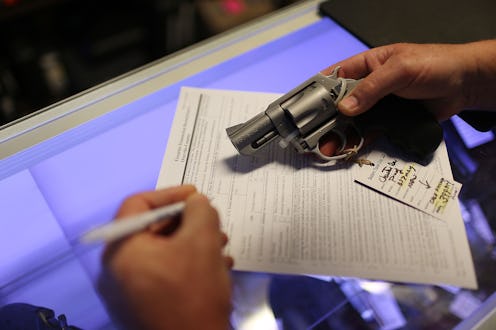News
You Can Be On The Terrorist Watch List & Buy Guns
It appears as if the perpetrator of Sunday's horrific shooting in Orlando was definitely on the radar of federal authorities. Yet questions have been raised regarding how someone under terrorist suspicion would be allowed to purchase military-grade weapons. So how can you be on the terrorist watch list and still buy guns? There is a simple answer and a not so simple one.
The man who killed 49 people at a popular Orlando nightclub and injured 53 more apparently purchased his arsenal legally and recently. According to The New York Times, a handgun and a "long gun" were purchased within days of the June 12 shooting. He even had a current license to work as a security guard. So how did someone who was investigated not once but twice manage to purchase such a deadly cache?
The simple answer is that the two investigations by federal authorities determined that the shooter didn't have any strong ties with terrorist organizations, and didn't appear to be an immediate threat. One investigation in 2013 concluded that he didn't possess any kind of credible threat, while another in 2014 found a spurious connection to an American suicide bomber in Syria, but otherwise nothing credible which would have led agents to continue to monitor him. By law, his name would have then had to be removed from the databases.
So without any concrete evidence that this American citizen had ties to terrorism, foreign or domestic, there was little officials could be expected to do. In that very limited sense, the terrorist watch list — an interlocking series of databases maintained by the national security apparatus — worked as it was supposed to: quietly, in the background, and without restricting the rights and freedoms the shooter had by law.
Until it stopped working. While the purpose of the watch list has essentially stayed the same since 9/11, some people still argue that there is a lot more that the government could be doing to keep people safe from the mass shooting events that have become a depressingly regular occurrence.
Last year, Senate Democrats lobbied for funding to establish a law banning suspected terrorists from purchasing firearms. Republicans blocked the bill on the grounds that it might unnecessarily infringe on Second Amendment rights. However, what really seems to be necessary is to rethink how the national security apparatus functions. With names slow to come off watch lists that are growing longer by the day, the sheer volume of data that must be sifted through is staggering.
As the number of people on the assorted terrorist watch lists have swelled to just under half a million people in 2014, predicting who is likely to become a threat, and when, has become a game of finding needles in haystacks. Our reliance on data and mass surveillance ironically seems to have ended up making us more susceptible to lone-wolf attacks.
Regardless of where you stand on Second Amendment issues, at the end of the day, keeping firearms out of the hands of potential mayhem-makers — whether their self-justification for violence is religious, ideological, or personal in nature — should be a no-brainer for lawmakers.
